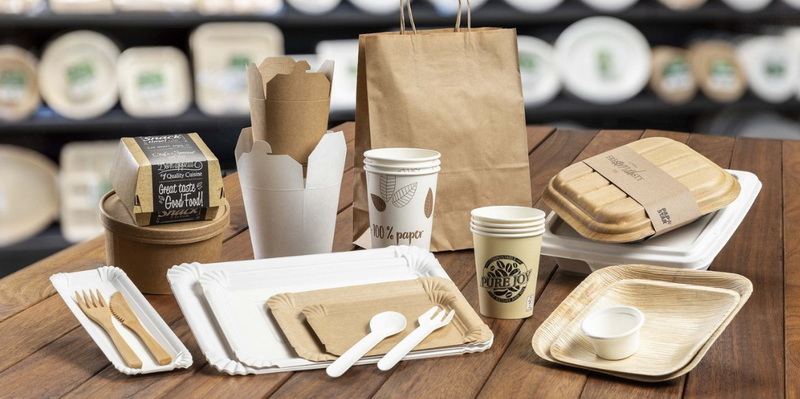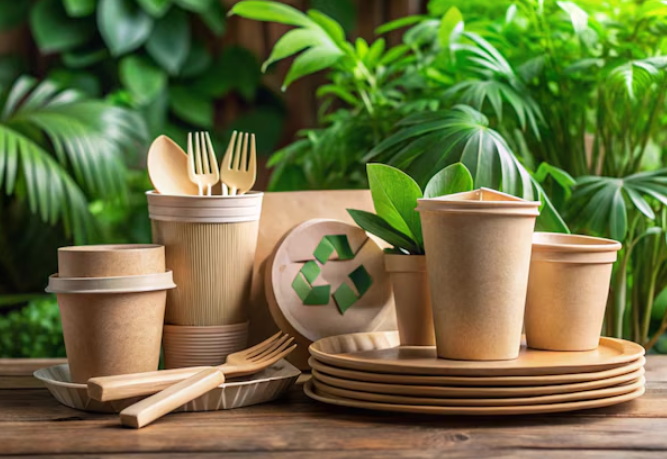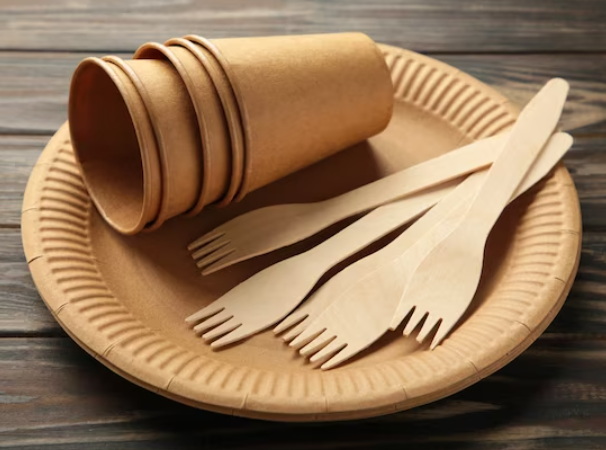
Content Menu
● The Rise of Eco-Friendly Disposable Tableware
>> Why the Shift Away from Traditional Plastics?
>> What Defines Eco-Friendly Disposable Tableware?
● Global Market Overview
>> Major Exporting Countries and Hubs
>> Market Trends
● Leading Eco-Friendly Disposable Tableware Exporters
>> Top Exporters and Their Offerings
● Materials Used in Eco-Friendly Disposable Tableware
>> 1. Bagasse (Sugarcane Pulp)
>> 2. Palm Leaf and Areca Leaf
>> 3. Bamboo and Wood
>> 4. PLA (Polylactic Acid) Bioplastics
>> 5. Paper and Cardboard
● Certifications and Standards
>> Why Are Certifications Important?
● Challenges Faced by Eco-Friendly Disposable Tableware Exporters
>> 1. Cost Competitiveness
>> 2. Supply Chain and Scalability
>> 3. Regulatory Hurdles
>> 4. Consumer Awareness
● How to Choose a Reliable Eco-Friendly Disposable Tableware Exporter
>> Key Considerations
● The Future of Eco-Friendly Disposable Tableware Export
>> Emerging Trends
● Conclusion
● FAQ
>> 1. What materials are most commonly used by eco-friendly disposable tableware exporters?
>> 2. How can I verify if a disposable tableware exporter is genuinely eco-friendly?
>> 3. Which countries are leading in exporting eco-friendly disposable tableware?
>> 4. What are the main challenges faced by eco-friendly disposable tableware exporters?
>> 5. Can eco-friendly disposable tableware be customized for branding or specific uses?
● Citations:
The global movement toward sustainability has accelerated the demand for eco-friendly disposable tableware. As environmental concerns intensify and regulations tighten against single-use plastics, businesses and consumers alike are seeking alternatives that minimize ecological impact. This shift has given rise to a new breed of manufacturers and exporters specializing in biodegradable, compostable, and renewable-material tableware. But are there truly reliable eco-friendly disposable tableware exporters? What sets them apart, and how can businesses make informed choices when sourcing such products? This article delves deep into the world of eco-friendly disposable tableware exporters, exploring the market landscape, leading players, materials, certifications, challenges, and future trends.

The Rise of Eco-Friendly Disposable Tableware
Why the Shift Away from Traditional Plastics?
Traditional disposable tableware, predominantly made from petroleum-based plastics, has contributed significantly to global pollution. These products often take centuries to decompose, leading to overflowing landfills and marine pollution. In response, governments, corporations, and consumers are pushing for alternatives that align with circular economy principles and reduce environmental footprints[1][2].
What Defines Eco-Friendly Disposable Tableware?
Eco-friendly disposable tableware is typically:
- Made from renewable resources (e.g., bamboo, sugarcane bagasse, palm leaves, cornstarch)
- Biodegradable or compostable within a short timeframe
- Free from harmful chemicals and toxins
- Produced using sustainable manufacturing practices[1][5][6]
Global Market Overview
Major Exporting Countries and Hubs
The disposable tableware export market is robust and rapidly evolving. Key exporting countries include:
- China: Home to numerous manufacturers focusing on both traditional and eco-friendly tableware, with a significant export footprint worldwide[3][4].
- India: A leading exporter of biodegradable and compostable tableware, particularly products made from bagasse and plant fibers[6][7][8].
- Europe: Countries like Germany and the UK have strong manufacturers emphasizing bioplastics and sustainable materials[5].
Market Trends
- Growing Demand: As sustainability becomes a priority, demand for eco-friendly options is surging, especially in hospitality, catering, and food delivery sectors[1][2].
- Product Innovation: Exporters are investing in R&D to develop products that are both functional and environmentally responsible (e.g., oil-proof bagasse plates, modular trays, custom-printed compostables)[1][8].
- Regulatory Compliance: Exporters must adhere to international standards and certifications, ensuring their products meet the eco-criteria of importing countries[6][8].
Leading Eco-Friendly Disposable Tableware Exporters
Top Exporters and Their Offerings
| Exporter Name | Country | Key Eco-Friendly Products | Notable Features |
| Ancheng | China | Plates, cutlery, stirrers (wood, bamboo) | Custom solutions, renewable materials1 |
| Goldleaf | India | Sugarcane bagasse plates, bowls, trays | High-quality, sustainable, tailored for markets2 |
| Dinearth | India | Plates, bowls, trays, cutlery (bagasse, compostable) | Oven/microwave safe, certified, export-focused6 |
| Ziffe Exports | India | Palm leaf plates, areca leaf plates, fiber tableware | 100% biodegradable, compostable, global reach7 |
| Biotrem, Vegware, Eco-Products | Global | Biodegradable plates, cups, cutlery (various) | Innovation, global distribution15 |
| Cosmos Eco Friends | India | PLA-based plates, cups, trays | Large supply chain, certifications8 |
| Jiaxing Kins Eco Material Co., Ltd. | China | Eco-friendly plates, bowls, cutlery | Sustainability focus, export expertise4 |
These companies are not only manufacturing but actively exporting eco-friendly disposable tableware to markets in North America, Europe, the Middle East, and beyond.
Materials Used in Eco-Friendly Disposable Tableware
1. Bagasse (Sugarcane Pulp)
- Byproduct of sugarcane processing
- Compostable, sturdy, heat-resistant
- Widely used by Indian exporters like Goldleaf and Dinearth[2][6][8]
2. Palm Leaf and Areca Leaf
- Naturally fallen leaves pressed into shape
- Biodegradable, chemical-free, elegant appearance
- Key products of Ziffe Exports[7]
3. Bamboo and Wood
- Fast-growing, renewable resources
- Strong, compostable, suitable for cutlery and plates[1][5]
4. PLA (Polylactic Acid) Bioplastics
- Derived from cornstarch or sugarcane
- Industrially compostable, clear and flexible
- Used by Cosmos Eco Friends and other global manufacturers[8]
5. Paper and Cardboard
- Often coated with plant-based or compostable linings
- Widely used for cups, plates, and trays[4][5]
Certifications and Standards
Why Are Certifications Important?
Certifications ensure that products are genuinely eco-friendly and meet international safety and compostability standards. Key certifications include:
- BPI Compostable (US)
- EN 13432 (EU)
- OK Compost (TÜV Austria)
- FDA and LFGB Food Safety
Exporters like Dinearth and Cosmos Eco Friends highlight their certifications to build trust with global buyers[6][8].

Challenges Faced by Eco-Friendly Disposable Tableware Exporters
1. Cost Competitiveness
Eco-friendly materials and production processes are often more expensive than traditional plastics, impacting pricing and adoption rates.
2. Supply Chain and Scalability
Sourcing sustainable raw materials at scale and maintaining consistent quality can be challenging, especially for exporters serving multiple international markets[4][8].
3. Regulatory Hurdles
Exporters must navigate a complex web of international regulations, import restrictions, and certifications, which can vary widely by country[3][6].
4. Consumer Awareness
Educating end-users and business clients about the benefits and proper disposal of eco-friendly tableware remains an ongoing task[5][7].
How to Choose a Reliable Eco-Friendly Disposable Tableware Exporter
Key Considerations
- Material Transparency: Ensure the exporter provides clear information about raw materials and production processes.
- Certifications: Look for internationally recognized eco-certifications.
- Customization and Product Range: Assess whether the exporter can tailor products to your needs (e.g., branding, sizes, packaging).
- Supply Capacity: Check the exporter's ability to handle bulk orders and timely delivery.
- Sustainability Practices: Evaluate the company's overall commitment to environmental responsibility, including energy use, waste management, and social impact[1][4][8].
The Future of Eco-Friendly Disposable Tableware Export
Emerging Trends
- Circular Economy Integration: More exporters are adopting cradle-to-cradle principles, designing products for reuse, recycling, or composting at end-of-life[5][8].
- Technological Innovation: Advances in bioplastics, edible tableware, and water/oil-resistant coatings are expanding product possibilities.
- Global Collaboration: Exporters increasingly partner with international brands, NGOs, and governments to promote sustainable dining solutions[1][5].
- Consumer-Driven Demand: As consumers become more eco-conscious, exporters are responding with greater transparency, traceability, and innovation[2][6].
Conclusion
Eco-friendly disposable tableware exporters are not only real—they are thriving and transforming the global food service landscape. From China and India to Europe and beyond, these exporters offer a diverse range of sustainable, certified, and high-quality products that help businesses and consumers reduce their environmental impact. While challenges remain, the sector is characterized by rapid innovation, growing demand, and a strong commitment to a cleaner, greener future. Choosing the right exporter involves careful consideration of materials, certifications, capacity, and sustainability ethos. As the world moves toward banning single-use plastics and embracing circular solutions, eco-friendly disposable tableware exporters will play a pivotal role in shaping a sustainable tomorrow.

FAQ
1. What materials are most commonly used by eco-friendly disposable tableware exporters?
Eco-friendly disposable tableware exporters primarily use materials such as sugarcane bagasse, palm leaves, bamboo, wood, PLA (bioplastics), and paper. These materials are renewable, biodegradable, and compostable, making them ideal for sustainable single-use products[1][2][5][8].
2. How can I verify if a disposable tableware exporter is genuinely eco-friendly?
Look for certifications like BPI Compostable, EN 13432, OK Compost, and food safety approvals (FDA, LFGB). Reputable exporters will provide documentation and details about their materials and production processes to ensure transparency and compliance with international standards[6][8].
3. Which countries are leading in exporting eco-friendly disposable tableware?
India and China are among the top exporters, with companies like Goldleaf, Dinearth, Ziffe Exports, and Jiaxing Kins Eco Material Co., Ltd. leading the way. European manufacturers such as Biotrem and Papstar GmbH are also significant players in the global market[1][3][4][6][7].
4. What are the main challenges faced by eco-friendly disposable tableware exporters?
Key challenges include higher production costs compared to traditional plastics, sourcing sustainable raw materials at scale, navigating international regulations, and educating consumers about proper disposal and benefits of eco-friendly products[4][5][8].
5. Can eco-friendly disposable tableware be customized for branding or specific uses?
Yes, many exporters offer customization options, including branded printing, product sizing, and packaging tailored to client needs. This is especially popular among restaurants, caterers, and event organizers seeking to enhance their sustainability image[1][8].
Citations:
[1] https://www.anchenggy.com/blog/top-10-biodegradable-tableware-manufacturers-in-the-world.html
[2] https://goldleafindia.in/blog-detail/sugarcane-bagasse-disposable-products-exporter-to-qatar
[3] https://www.seair.co.in/disposable-tableware-export-data.aspx
[4] https://huntersourcing.com/disposable-tableware-supplier/
[5] https://ecoclicky.com/en/global-biodegradable-tableware-manufacturers/
[6] https://www.dinearth.com/indias-leading.html
[7] https://www.ziffeexports.com
[8] https://www.sumkoka.com/best-compostable-tableware-manufacturers-in-india.html
[9] https://dir.indiamart.com/impcat/eco-friendly-disposable-plates.html?biz=20
[10] https://www.dinearth.com/worlds-no-1-exporter-and-manufacturer-of-sugarcane-bagass-plates-bowls-and-eco-friendly-tableware.html
[11] https://engreen.shop/product-category/plate/
[12] https://www.volza.com/p/disposable-plates/export/export-from-china/
[13] https://www.anzhucraft.com/disposable-tableware-manufacturers-in-usa/
[14] https://www.idaseco.com/disposable-tableware/
[15] https://eximdispoware.com
[16] https://www.businesscoot.com/en/study/the-disposable-tableware-market-united-kingdom
[17] https://www.europages.co.uk/companies/manufacturer%20of%20disposable%20tableware.html
[18] https://www.alibaba.com/showroom/biodegradable-tableware.html
[19] https://www.mountain-bio.com/product/compostable-disposable-sugarcane-bagasse-tableware
[20] https://foodhq.world/issue-sections/catering-hospitality/disposables/global-biodegradable-disposable-tableware-market-2023-to-2030-driven-by-environmental-sustainability-trends/

















